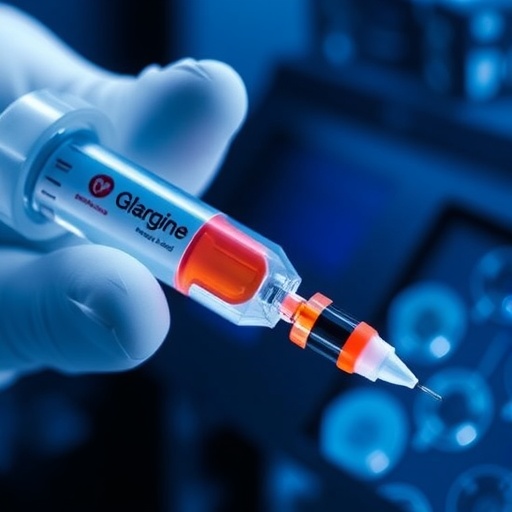A recent multicenter clinical study conducted in India has unveiled significant insights into the safety and efficacy of Insulin Glargine 300 U/ml. This Phase 4 trial is particularly crucial for insulin-naïve individuals diagnosed with Type 2 Diabetes who remain uncontrolled on oral anti-hyperglycemic drugs. The SAFEGUARD Study, meticulously outlined in the journal Diabetes Therapy, aims to address the increasing burden of diabetes management among patients who are hesitant to initiate insulin therapy.
The rise in Type 2 Diabetes globally prompts urgent exploration of innovative treatment strategies that can enhance patient outcomes. This study specifically targets insulin-naïve individuals, who often find themselves reluctant to transition from oral medications to insulin regimens. By investigating the role of Insulin Glargine 300 U/ml, the researchers hope to provide a viable alternative for patients struggling with glycemic control, thus reducing the risk of diabetes-related complications.
Participants in the study were eligible based on their status as insulin-naïve and their inadequate glycemic control despite the use of oral anti-hyperglycemic agents. This inclusion criterion reflects a common scenario faced in diabetes management, pointing toward the necessity for more effective therapeutic options. The significance of providing a well-tolerated and effective insulin formulation becomes increasingly evident against the backdrop of soaring diabetes prevalence.
Throughout the study, the administration of Insulin Glargine 300 U/ml not only aimed to achieve optimal glycemic levels but also focused on minimizing the risk of hypoglycemia, a concerning side effect often associated with insulin therapy. The data collected from this study serve to illuminate not just the pharmacological aspects of Insulin Glargine, but also the patient experience, which remains pivotal to patient adherence and overall satisfaction.
The findings of the SAFEGUARD Study have the potential to reshape clinical practices surrounding insulin initiation. With enhanced education regarding the safety profile and effectiveness of Insulin Glargine, healthcare providers might be more inclined to recommend insulin therapy for patients who have previously been reluctant. The positive outcomes from this study could prioritize patient-centered care while addressing the broader implications of diabetes management.
Moreover, the study emphasizes the importance of collaborative care. It generated insightful data on the training and support needs of both healthcare providers and patients. Improved communication channels and educational interventions can facilitate a smoother transition to insulin therapy, which ultimately fosters better health outcomes. This holistic approach is paramount as patient adherence is often hindered by a lack of knowledge and fear of initiating insulin treatment.
The implications of the SAFEGUARD Study extend beyond individual patient outcomes, as it contributes to the broader landscape of diabetes care. As healthcare systems grapple with the implications of rising diabetes prevalence, findings from such studies are critical in guiding policies aimed at promoting health equity. Accessibility to effective diabetes management tools and strategies remains a global health priority, necessitating further discourse in the medical community.
In exploring the metrics of efficacy and safety, the study showcases a thorough evaluation process. Researchers must delve deep into data analysis to ensure that the findings are robust and translatable into clinical practice. This entails looking at various parameters, such as HbA1c levels, weight changes, and patient-reported outcomes, all of which provide a well-rounded picture of treatment success.
In terms of safety, the study also extensively documented adverse events, presenting a clear visual of the risk-benefit profile associated with Insulin Glargine use. Understanding these nuances allows healthcare providers to tailor treatment options more effectively, encouraging proactive management of diabetes through easily tolerated insulin regimens.
Publications like the one from the SAFEGUARD Study encourage ongoing discussions surrounding diabetes therapies. Such discourse fosters collaborations among researchers, clinicians, and policymakers striving to enhance patient care and optimize diabetes management practices. The rigorous nature of the study bolsters confidence in its findings, fueling momentum toward broadening treatment paradigms.
As the medical community continues to explore therapeutic opportunities for Type 2 Diabetes, the importance of evidence-based research cannot be overstated. The SAFEGUARD Study stands as a beacon of clinical investigation, revealing not just the potential benefits of Insulin Glargine but also addressing the barriers faced by patients embarking on insulin therapy. This research underscores the dynamic interplay between clinical efficacy and patient comfort.
In conclusion, the SAFEGUARD Study delineates a path forward in the realm of diabetes management. As healthcare providers integrate these findings into their practice, addressing common concerns surrounding insulin use will remain fundamental. This comprehensive evaluation of Insulin Glargine 300 U/ml highlights the transformative potential it holds for those grappling with Type 2 Diabetes, aligning with the overarching goal of improving patient quality of life.
In summary, the outcomes of this multicenter clinical study herald a new chapter in Type 2 Diabetes management, propelling discussions around effective insulin therapy and striving for enhanced therapeutic options. As we await further expansions of the study’s findings, the medical community remains hopeful for a future where diabetes can be managed more effectively and empathetically, ultimately benefiting millions around the globe.
Subject of Research: Insulin Glargine for Type 2 Diabetes Management
Article Title: Multicenter, Phase 4 Clinical Study from India to Evaluate the Safety and Efficacy of Insulin Glargine 300 U/ml in Insulin-Naïve People with Type 2 Diabetes Uncontrolled on Oral Anti-hyperglycemic Drugs: SAFEGUARD Study
Article References:
Mohan, V., Sethi, B., Jain, S.M. et al. Multicenter, Phase 4 Clinical Study from India to Evaluate the Safety and Efficacy of Insulin Glargine 300 U/ml in Insulin-Naïve People with Type 2 Diabetes Uncontrolled on Oral Anti-hyperglycemic Drugs: SAFEGUARD Study.
Diabetes Ther 16, 1367–1383 (2025). https://doi.org/10.1007/s13300-025-01736-5
Image Credits: AI Generated
DOI: https://doi.org/10.1007/s13300-025-01736-5
Keywords: Insulin Glargine, Type 2 Diabetes, clinical study, safety, efficacy, insulin therapy, diabetes management, patient outcomes.




